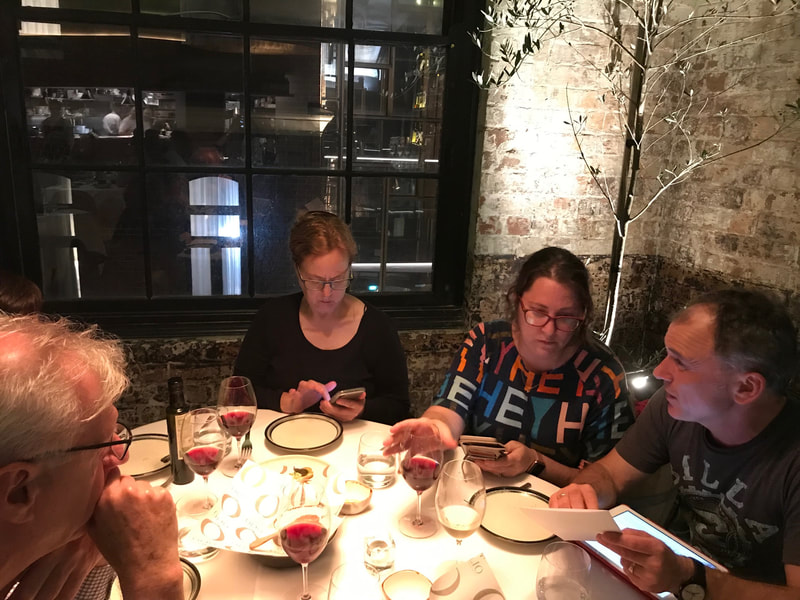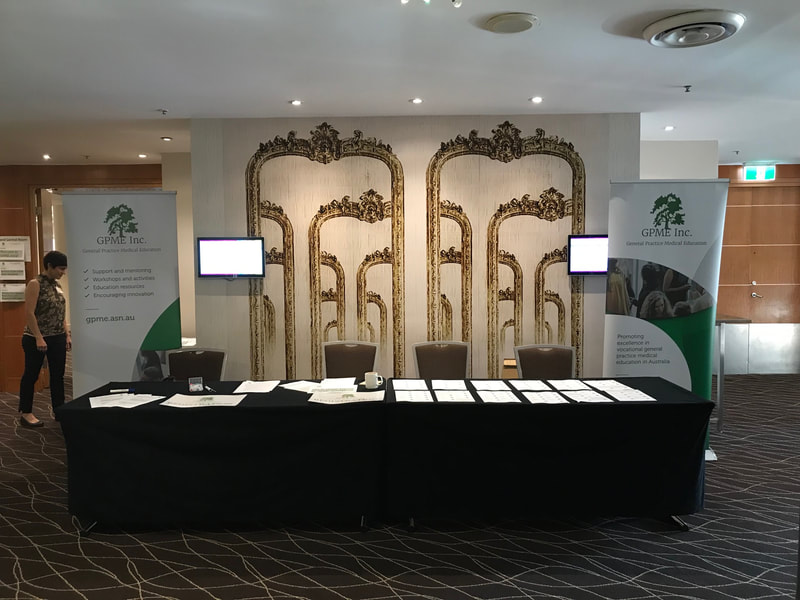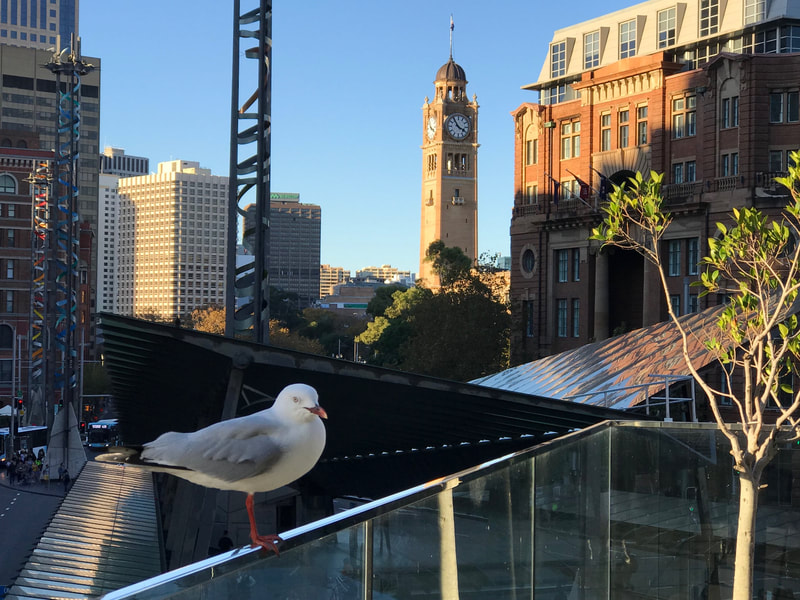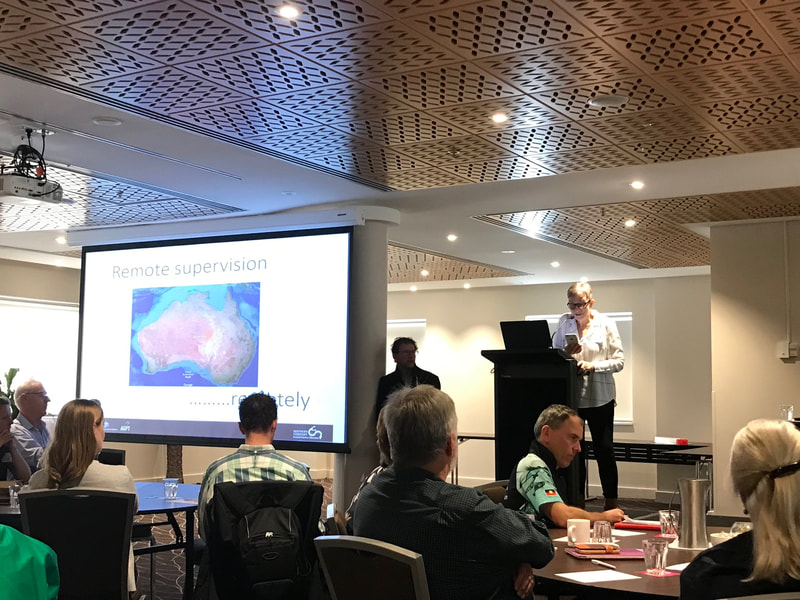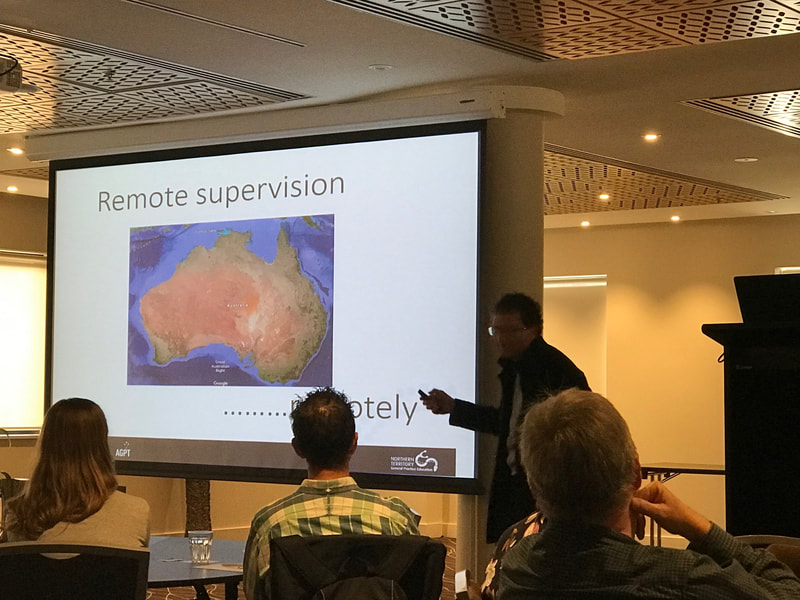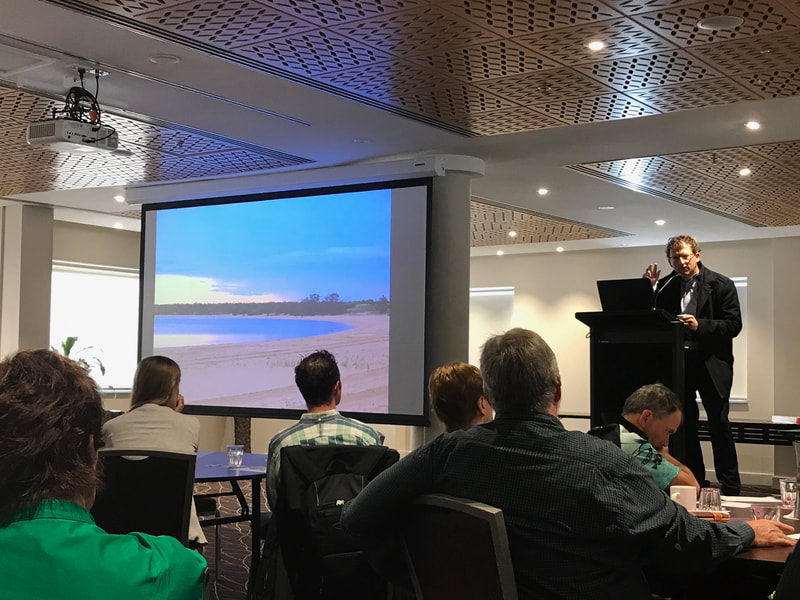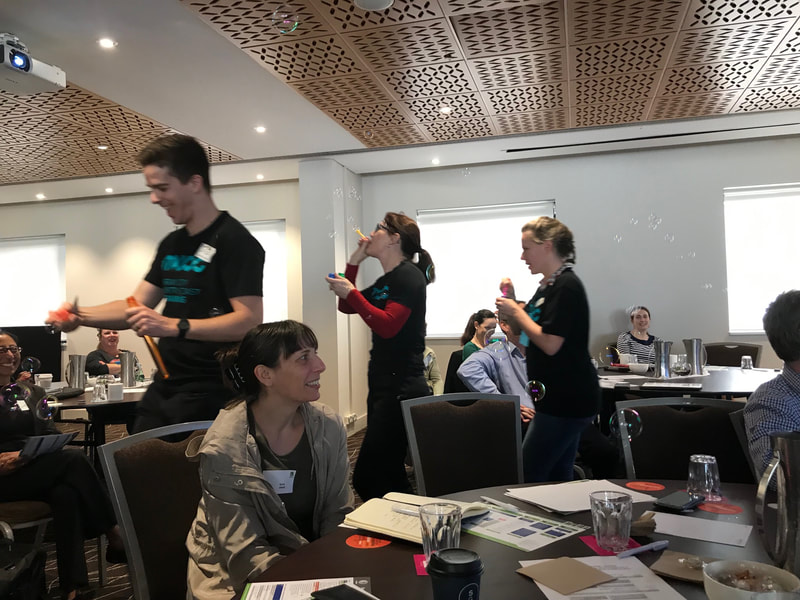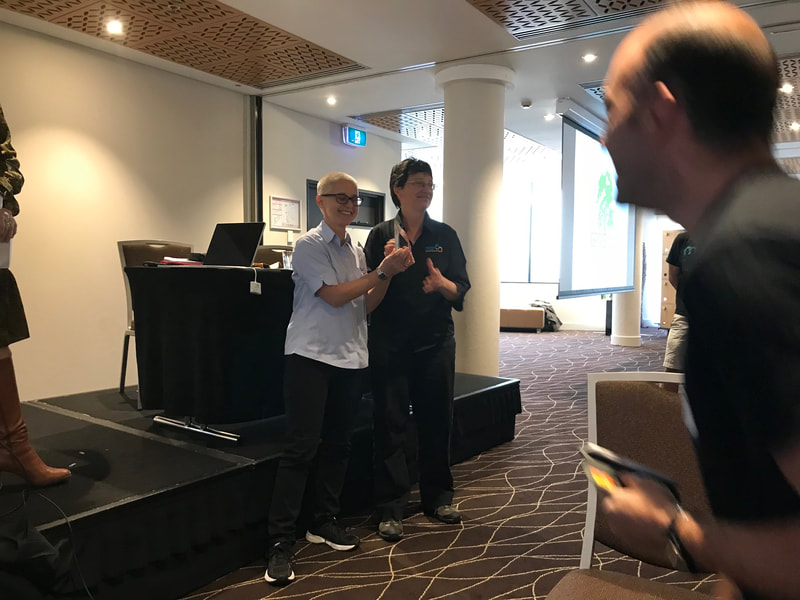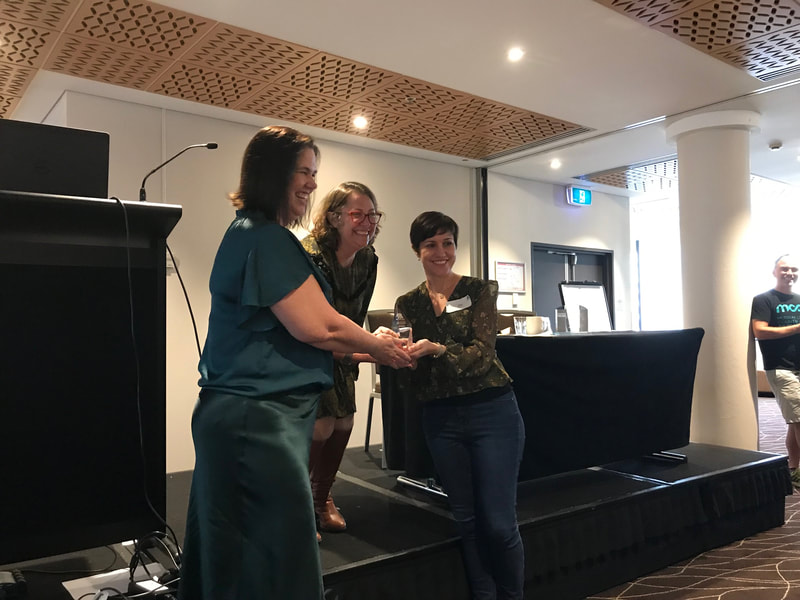Thursday 16th MayThe meeting started with Ed Poliness welcoming the participants and delivering the Acknowledgement of Country. This was followed by an ice-breaker based on a multi-group activity with different groups vying to solve a nine-letter word puzzle. The make-up of the groups then changed and the next challenge involved solving a numerical problem. Much fun was had by all with an opportunity to meet many colleagues. The keynote speaker was Dr John Kelly from NTGPE. John is a key proponent of remote supervision delivery through his work at Laynhapuy Homelands Aboriginal Corporation. He worked in the Homeland areas of NE Arnhem land, the ancestral land of the Yolngu people. He described being orientated by the nurse and the aboriginal cultural mentor to the area and to the work. John said he had to be honest and humble and be prepared to learn from his mistakes. His role provided health care and education to 12 Outstations. Living in the Outstations, aboriginal people are able to follow the traditional way of life. John said that these Outstations had no alcohol, petrol sniffing, gambling or suicide problems. The crime rate is minimal. The reason he gave for this low rate of social problems is that the aboriginal people in the Homelands are connected to the land. Difficulties he encountered included that English is the 3rd language, the need to understand men’s & women’s business, communicating issues when people may have “shame” and coping with a set of very different medical conditions such as rheumatic heart disease, strongyloidiasis etc. In addition, you needed to be very aware of the crocodiles. John found that valuable tools in these remote areas were Video-otoscopy, photography and video-recording, with appropriate permission, and using these recordings to get second opinions from specialist in distant centres. John’s technique for remote supervision is to arrange orientation for the registrar similar to his experience. He then sits in and observes and gives feedback on 30 to 40 consultations. He then has a clear of idea of the trainee’s capabilities. Remote supervision is provided by video-teleconference and previously he made himself continuously available for the registrar. Currently, he lives in Sydney and shares supervision with a supervisor who is on site 3 days a week. The internet has been a great advance for training purposes and he is able to do real time observation for ECTV’s. The limitations of this technique include difficulty in observing the clinical examination, demonstrating procedures and loss of internet connectivity. John supervises all levels of registrar who stay between six and twelve months. He has found that almost all the registrars have been very receptive to training but there has been the occasional registrar in difficulty, usually the registrar with preconceived ideas. An extensive discussion followed John’s presentation. When asked about funding for this supervision he advised that the funding came from the federal DOH. He not only supervises the registrars but also allied health personnel. There was a question about safety for the registrar and coping with emergency situations. John advised that the registrar is always accompanied by a nurse when they go to the Outstations. Training is provided for common emergency scenarios. The registrar’s progress is audited from the notes and documentation. There was a question about the relationship with the registrar and John pointed out that when they went out, he would take the 4-wheel-drive. The time together provided a good opportunity for discussion. During the discussion John said that even in the mainstream model where the registrar may feel remote even though they are in the next room. One of the GPT3 registrars present said that she was envious of the registrars supervised by John. Following morning tea, we had the choice of four concurrent Workshops:
In the afternoon there were six concurrent “World Café” discussions. Discussions from these will go towards a more in-depth discussion informing the direction of GPME at the September 2019 Workshop. The last session on Thursday included a choice of a further four concurrent Workshops:
Friday 17th MaySusan Tyler-Freer started the day with the Acknowledgment to Country. Graham Emblen (President) then introduced all the executive members. Lisa Fraser (Treasurer), Karen Aarons, Rebecca Lock, Rebecca Stewart and Greg Gladman. He said that currently GPME has a membership of 163. There were 92 participants at the meeting. He acknowledged the hard work of the education committee in organising the Workshop. The education committee includes Edmund Poliness (Chair), Denise Findlay, Rebecca Lock, Karen Savery, Susan Tyler-Freer and Hubert van Doorn. Next, Graham talked about GPME relationships with the Lead Medical Education Committee (LMEC), Australian College of Rural & Remote Medicine (ACRRM), Royal Australian College of General Practice (RACGP), General Practitioner Supervisors Australia (GPSA), the Department of Health (DOH) and the Registrar Training Organisation Network (RTON). GPME is independent of these organisations and is able to develop its own direction. The medical educator goal is to ensure that post-graduate medical education trains good quality general practitioners. He asked the participants to read through the constitution so that they understood the purpose of GPME. He also asked participants to share their ideas and passion through GPME Graham advised that the Sept Workshop would have four Masterclass sessions to discuss:
Graham talked about the challenges and the opportunities for medical educators presented by the funding change in the near future with funding being provided by the Colleges instead of the DOH. Hubert van Doorn, Jan Hanson and Neil then discussed those core values in medical education which won’t change, the transition, and what can be improved. There was a short presentation from Paul Grinzi from GPME Communication and IT Committee (ACIT). He explained GPME social media presence on Twitter, Web - https://www.gpme.asn.au/ and the closed Facebook page which is managed jointly with Rebecca Stewart. Paul then talked about the 2019 General Practitioner Training and Education Conference (GPTEC) and Rebecca Stewart advised that there are two free passes to be won to the conference in September. The first session of the morning consisted of the 2019 Med-XX Challenge where a number of educators role-played scenarios, gave tips using rhyming verse on improving Workshop sessions and used improvisational dance to take us through GP training journey. Presentations were as follows:
A further four concurrent Workshops followed morning tea:
For the writer, the Educational potential of ECTVs using video was of interest. In this session educators from NTGPE presented how they use video-recordings of consultations to improve consultation technique. In the discussion that followed the storage and destruction of the digital recording was explained. In addition, the medico-legal difficulties posed for using this technique in Victoria & NSW were explored. An important strength of this technique is the way the registrar can be brought back into the moment of a particular part of the consultation. A practical weakness is that sound quality can be poor. Next a role-playing method for training supervisors to use video-ECTV was presented and finally a role-play, consultation between registrar and patient was recorded and analysed. ACRRM for DumMEs was an interesting presentation of the curriculum and assessment process for ACRRM Fellowship. Because registrars are choosing ACRRM assessment more ME’s are involved with training towards the rural Fellowship. Another presentation of interest was, “MESP – the role of the Medical Educator Supervisor Portfolio”. In this session ME’s from GP Synergy, where there are 9 MESPs, presented the role of the MESP in their organisation. GP Synergy supports 1542 accredited practices with 2095 supervisors of which 1669 are in SE Sydney. There was a good discussion comparing the experience in different RTO’s. It was felt that each GPME Workshop should include a session for medical educators with the role of supervisor support. GP synergy have made their Supervisor Toolkit available to all supervisors. This can be found at: https://supervisortoolkit.gpsynergy.com.au/. To round off the session we discussed the following scenarios:
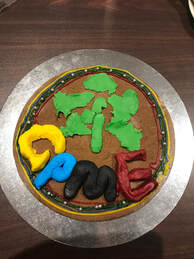 Following afternoon tea there was a fun reflective activity with a gingerbread decorating activity. There was a great temptation to eat the art before the judging was finished. The Workshop finished at 3.30pm.
0 Comments
Leave a Reply. |

